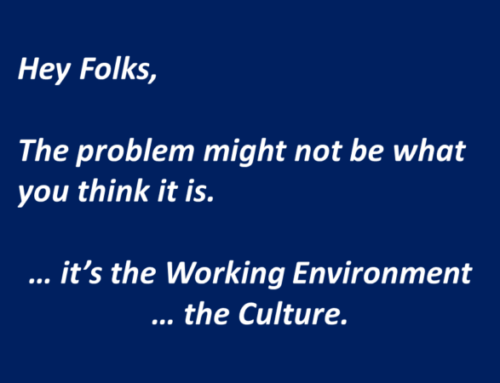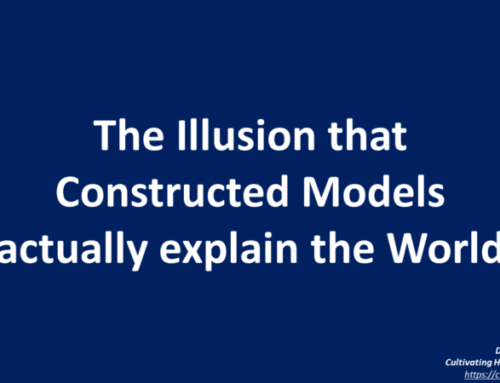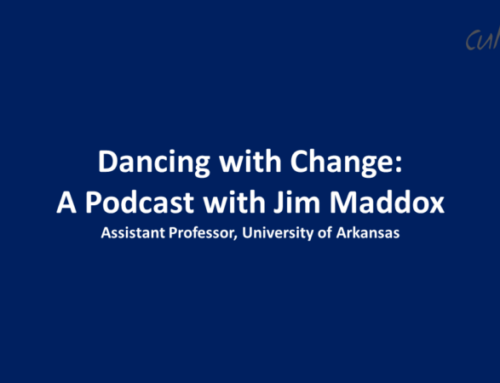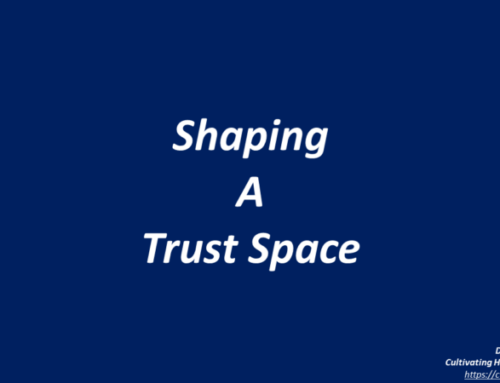Change: Elegantly Simple vs. Naively Simplistic
Life is complex, highly complex.
We live in an interconnected interdependent interrelated world.
Indeed, life is so complex that we will probably never completely understand it … whatever „understand“ may mean here.
It is also dynamic, therefore unpredictable. From the continuously expanding field of work on complex systems, we know that an event anywhere in the world can influence another far away. We don’t necessarily know how and we certainly cannot accurately predict such cause-and effect outcomes.
Our world in the second decade of the 21st Century is fast moving, continuously seeking and demanding answers to problems that we don’t really understand. Indeed, we far too rarely attempt to gain a real understanding of the challenges we are facing – and this is a huge problem – as a consequence of which we are suffering from the tendency towards seeking superficial naïve simplistic (non-)“solutions“ just to keep the „problem owner“ content; with consequences for Organisations and Society that are frequently harmful.
Solving Complex Problems – Change – requires approaches that go deep, using life’s natural flows.
Examples of popular populist Naively Simplistic „Solutions“ include …
- Political Correctness
An absurdly naive approach that supposedly combats discrimination. It doesn’t of course, as it ignores the fundamental reasons for bias. The problem remains. Overcoming bias requires deeper work. - Gender Quotas
Gender representation problems are synonymous with attitudes that perceive men and women as being of unequal value. Quotas are engineered. They cannot change attitudes. The problem remains. Overcoming bias requires deeper work. - Direct Democracy
It is no secret that the majority of political systems in the world are not fit for purpose, strongly biased, even corrupt. The call for direct democracy as a counterweight may be well-intentioned. However, true democracy assumes equal access to all relevant information as well as the ability of all to distinguish between „information“ and „misinformation“ – a naïve assumption. Brexit is an extremely unfortunate illustration of the outcome of such naïve simplistic thinking. The outcome is a shambles. - Communication Skills Training
Of course quality communication is essential to organisation productivity and innovation. This classic approach in the HR Development field has been with us for well over 40 years and in the past, I even used to offer such trainings myself … until I realised how nonsensical the idea was. Communication between people at any one moment is the outcome of so many different influencers, including, the situation; individual moods; individual awareness of patterns and associations; associations with particular words, expressions, status, positions, etc.; unconscious bias; chemistry between people; physical environment; a whole range of factors going on in each person’s life at that particular time; … and much more.
If you have groups of people willing to be manipulated, you can train them to act and react according to specific stimuli.
If on the other hand, you are interested in authentic interaction with integrity at the core … focus on developing deep relationships. - Intercultural Communication
The assumption that people can be sensibly categorised according to „nationality“, „ethnicity“, „belief“, etc. has informed approaches to human interaction around the world for over 40 years. I plead guilty to having worked with such approaches in the past. It is fundamentally flawed, naïve and simplistic. The above categories are all human constructs that do not and cannot define people in any meaningful way. Perhaps unwittingly, the approach significantly hinders serious attempts to promote genuine understanding among people. - Unconferences
In recent years, the notion of an „unconference“ has entered the organisational arena. There is no such thing: it’s an oxymoron. There is nothing wrong with a ‚conference‘. The key Question is how organisers decide to design and choreograph the event. A so-called „Unconference“ is nothing more than a bastardization that uses the mechanics of Open Space Technology (more on this later). It rarely contains a focal Question and I have yet to experience one that appeals to peoples‘ emotions. The rush of participants wishing to present their ideas rather tends to close space. The approach is superficial, simplistic, a total waste of resources and unlikely to lead to meaningful progress. Genuine meaningful human interaction requires depth.
… Additional examples abound …
Elegantly Simple Approaches to Solving Complex Challenges
True simplicity is genius. We need look no further than Picasso.
The beauty of aesthetic design lies in its simplicity … natural lines.
The beauty of nature lies in its wildness. It is what it is. Quite simply!
Because Organisations and of course Societies are by nature so complex, we can’t possibly understand all the dynamics … and we don’t need to. We do know that all Organisations, all Communities contain untapped resources that, by definition, are unknown, therefore potentially infinite. We also know that the source of these resources lies within and among the people … especially in the energy space that emerges when people from diverse backgrounds come together … Wisdom is inherent in groups.
We need simple yet profound approaches to meet today’s challenges.
Provide the resource with the space for people to answer their own Questions as a group … Open the Space to enable people to work WITH the inherent complexity, WITH the natural flows of life, letting go of the illusion (delusion?) of control.
Ingeniously Simple, highly innovative, highly successful Technological Business Platforms include …
- Facebook: a simple easy-to-use platform that enables people to connect anywhere anytime.
- LinkedIn: a simple easy-to-use platform that enables people to connect anywhere anytime for business purposes.
- Airbnb: a simple easy-to-use platform that connects home-owners/tenants who have underutilised capacity with travellers seeking an alternative to hotels and guest-houses.
When using these platforms we rarely think about and don’t even need to concern ourselves with the complexity behind the user interface … Ingenuity at its best.
Examples from the Organisation Development World
- Open Space Technology
A participatory Large Group Facilitation Approach to hosting meetings introduced to the world by Harrison Owen in 1985. It is based on learnings from traditional tribal meetings which recognised that inviting all members of a community to contribute to conversations that mattered to them creates a sense of mutual ownership. Its beauty lies in the simple user interface. The natural complexity of our world is inherent in the design … the primary reason it works. While it may appear simple, implementing Open Space well requires insight, experience and intensive preparation. The use of Open Space is now widespread as are other well-founded participatory approaches such as Appreciative Inquiry, World Café, Art of Hosting, and more.
https://en.wikipedia.org/wiki/Open_Space_Technology. - Dialogue Facilitation
In the words of David Bohm: „…it is proposed that a form of free dialogue may well be one of the most effective ways of investigating the crisis which faces society, and indeed the whole of human nature and consciousness today. Moreover, it may turn out that such a form of free exchange of ideas and information is of fundamental relevance for transforming culture and freeing it of destructive misinformation, so that creativity can be liberated.“
To the user who experiences Dialogue with skilful facilitation, the approach appears easy. Again, the inherent complexity of life is inbuilt. This is the genius. http://www.david-bohm.net/dialogue/dialogue_proposal.html. - cultureQs
A few days after a recent workshop in London, I received a call from a participant: an experienced Agile Coach struggling with a kamikaze mission to „transform“ a division in an organisation without the active support of the leadership. „This is brilliant,“ he said. „It’s so simple, and the way it got us connected meaningfully is ingenious. I have to get the Director to invite you.“
cultureQs: an easy to use face-to-face platform comprising powerful Questions with simple rules that reflect life’s natural process … enabling people to align and build trust while focusing on a „business Question“ essential to them all.
Let’s embrace complexity to enable people to find the answers we really need.
It’s natural; it’s fun; it’s highly effective; it’s highly profitable.
This is real change.






